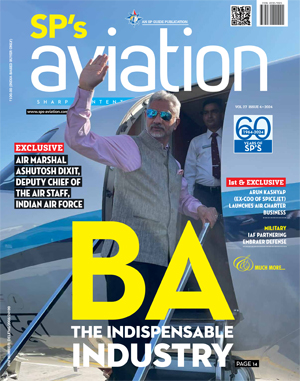INDIAN ARMED FORCES CHIEFS ON
OUR RELENTLESS AND FOCUSED PUBLISHING EFFORTS

SP Guide Publications puts forth a well compiled articulation of issues, pursuits and accomplishments of the Indian Army, over the years

I am confident that SP Guide Publications would continue to inform, inspire and influence.

My compliments to SP Guide Publications for informative and credible reportage on contemporary aerospace issues over the past six decades.
Invoke Damage Control Measures

Faced with the spectre of rising fuel prices, airlines in India need to streamline operations and adopt non-airfare revenues.
Unrelenting increase in crude oil prices and its deadly impact on aviation turbine fuel (ATF) seems to be killing the aviation industry, especially the airlines. Though airlines across the globe have borne the brunt, their counterparts operating in India have been the hardest hit having to grapple with the maximum price rise. Most, if not all, airlines in the country had reported losses not only in the third and fourth quarters, but the whole of 2007-2008 with the cumulative figure exceeding a staggering Rs 4,000 crore. The trend in the current financial year fares no better.
Worst hit are the no-frills low cost carriers (LCCs) which seem pitched against insurmountable hurdles that pose a serious threat to their very survival. The future of LCCs may continue to hang in balance because even though crude oil prices are showing some signs of stabilising, it is unlikely to come down substantially to hoist these airlines out of the crippling financial morass they find themselves in. While the now merged low cost airlines, such as Air Sahara (with Jet Airways as Jetlite) and the Air Deccan (with Kingfisher as Simplifly Deccan), may enjoy some breathing space due entirely to the deep pockets of their parent airlines, it would be the independent entities, the likes of SpiceJet and Indigo, that could get choked out of business or forced into mergers. For instance, even after the recent infusion of $80 million (Rs 340 crore) by American Distress Fund owner Wilbur Ross, SpiceJet remains open to consolidation.
Affording a cushion to the LCC in terms of working capital, the fund, naturally, cannot last forever. SpiceJet Director Ajay Singh put up a brave front, saying, I am not ruling out any future consolidation—whether we are the consolidator or consolidates. In reality, all the stakeholders appear to be looking to add as much value to the airline’s shares as possible before getting ‘consolidated’ by one of the bigger players. The airline has not only decided not to expand its fleet of 19 aircraft but also leased out two of its aircraft with two more to follow suit by cutting down considerably on its scheduled operations.





